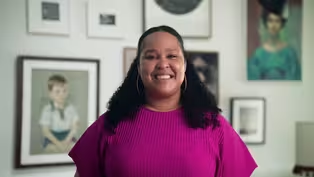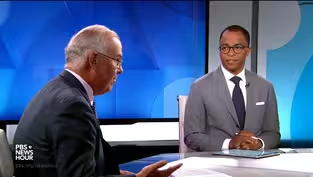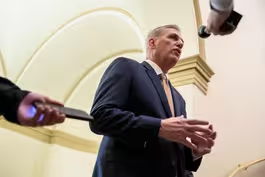
Link between lack of reproductive rights, domestic violence
Clip: 7/14/2023 | 5m 11sVideo has Closed Captions
The link between a lack of reproductive rights and domestic violence
Long before the Supreme Court struck down Roe v. Wade, researchers noticed a link between women having abortion access and a reduced risk of violence from men. In the wake of the court's decision, the opposite is happening and abortion restrictions have led to a significant uptick in intimate partner violence. Amna Nawaz discussed more with NewsHour health reporter Laura Santhanam.
Problems playing video? | Closed Captioning Feedback
Problems playing video? | Closed Captioning Feedback
Major corporate funding for the PBS News Hour is provided by BDO, BNSF, Consumer Cellular, American Cruise Lines, and Raymond James. Funding for the PBS NewsHour Weekend is provided by...

Link between lack of reproductive rights, domestic violence
Clip: 7/14/2023 | 5m 11sVideo has Closed Captions
Long before the Supreme Court struck down Roe v. Wade, researchers noticed a link between women having abortion access and a reduced risk of violence from men. In the wake of the court's decision, the opposite is happening and abortion restrictions have led to a significant uptick in intimate partner violence. Amna Nawaz discussed more with NewsHour health reporter Laura Santhanam.
Problems playing video? | Closed Captioning Feedback
How to Watch PBS News Hour
PBS News Hour is available to stream on pbs.org and the free PBS App, available on iPhone, Apple TV, Android TV, Android smartphones, Amazon Fire TV, Amazon Fire Tablet, Roku, Samsung Smart TV, and Vizio.
Providing Support for PBS.org
Learn Moreabout PBS online sponsorshipAMNA NAWAZ: Long before the Supreme Court struck down Roe v. Wade, ending the constitutional right to an abortion, researchers noticed a link between women having abortion access and a reduced risk of violence from men.
Now, in the wake of the court's decision, the opposite is happening, both anecdotally and in the data.
Abortion restrictions have led to a significant uptick in intimate partner violence.
The National Domestic Violence Hotline reports seeing nearly 100 percent increase in calls.
Our health reporter, Laura Santhanam, spoke to experts about this for a recent story on our Web site.
She joins me now.
Laura, it's good to see you.
LAURA SANTHANAM: Great to see you.
AMNA NAWAZ: So, you have been talking to the experts, reporting on this disturbing trend.
LAURA SANTHANAM: Yes.
AMNA NAWAZ: What are they telling you right now.
LAURA SANTHANAM: So, each year, roughly 12 million people are affected by domestic violence in the U.S. And part of what perpetuates that violence are control, isolation of victims by the abusers.
When we saw overnight in many places the loss of access to nearby abortions just evaporate, people began to suffer.
And we're seeing preliminary data, anecdotal evidence that suggests that all of the warning signs that we were hearing about before Dobbs came down are starting to materialize.
AMNA NAWAZ: And, Laura, the National Domestic Violence Hotline says 100 percent increase in calls.
What does that mean?
LAURA SANTHANAM: There's so much need going on right now.
And it's coming through the hot line and in many places.
Right now, the National Domestic Violence Hotline is hearing more than 3,000 calls per day, on average.
And that's the highest volume that they have seen ever since they were established in 1996, right?
So it's just -- it's this massive uptick.
And there's definitely just, again, preliminary evidence pointing to Dobbs making things worse.
AMNA NAWAZ: And you spoke to a woman named Crystal Justice from the National Domestic Violence Hotline.
Here's what she had to say.
CRYSTAL JUSTICE, National Domestic Violence Hotline: After the Dobbs decision, we knew that we were going to be hearing from survivors all over the country who were going to need critical support to talk about the abuse they were experiencing, to talk about the fears that they were feeling, that now their access to reproductive health care has essentially been removed.
And I think, Laura, it's really important to say that an abusive partner will use any tool in their toolbox to exert power and control over their victim.
AMNA NAWAZ: Laura, when it comes to tools in that toolbox, experts told you about an increase in something called reproductive coercion.
What does that mean?
And what does that look like in real life?
LAURA SANTHANAM: Reproductive coercion is a form of domestic violence that we're hearing more about, especially after Dobbs.
What that means is an abuser could sabotage contraception, could intercept birth control, could otherwise just hinder a person's ability to control their own -- have control over their own body.
In my reporting, I came across a story of a woman who was in an abusive relationship and could not leave her home, but she could receive birth control.
She got it through the mail and was able to keep control over that much of her life, until her abuser discovered that she was receiving her birth control through the mail.
He began intercepting her mail, got her birth control.
Eventually, she became pregnant, and she was in a state where she could not access abortion.
She also didn't have the financial wherewithal to go somewhere else where she legally could.
So, that -- and that terrible story, it's not a one-off.
According to experts who I have been talking to, it's happening again and again and this country.
And it's getting worse after Dobbs.
AMNA NAWAZ: The stories are so alarming and so disturbing, but what is the data showing?
What do the numbers say about this right now?
LAURA SANTHANAM: It takes time to get the big federal data sets.
But what we're seeing in things like the National Domestic Violence Hotline is a nearly 100 percent increase in these calls about reproductive coercion alone.
The experts there also told me that they have seen more than 20,000 calls related to nonconsensual sex.
So, that gives you a sense of, like, how these power dynamics are being manipulated and used, and people who are losing access to one thing to keep them -- to give them some distance from their abusers.
AMNA NAWAZ: Laura, people will hear all this and wonder, what should I do if I need help?
What if someone I know needs help?
What can we tell them?
LAURA SANTHANAM: Well, help is available?
The National Domestic Violence Hotline number is there.
It's available 24 hours a day.
It's 800-799-SAFE.
You can chat at thehotline.org, or you can text START.
That's 88788, that it's, again, available 24 hours a day, seven days a week across the country.
They're there to help make safety plans, find resources, figure out how you can get from a terrible situation to something hopefully better.
AMNA NAWAZ: That is our health reporter, Laura Santhanam.
Laura, thank you so much.
LAURA SANTHANAM: Thank you.
A Brief But Spectacular take on second acts
Video has Closed Captions
Clip: 7/14/2023 | 3m 15s | A Brief But Spectacular take on second acts (3m 15s)
Brooks and Capehart on Biden's achievements at NATO summit
Video has Closed Captions
Clip: 7/14/2023 | 11m 2s | Brooks and Capehart on Biden's accomplishments at NATO summit, GOP defense policy (11m 2s)
Carpenter's new book offers lessons on life and good work
Video has Closed Captions
Clip: 7/14/2023 | 7m 38s | Carpenter Mark Ellison's new book 'Building' offers lessons on life and good work (7m 38s)
House GOP adds culture war issues to defense spending bill
Video has Closed Captions
Clip: 7/14/2023 | 6m 34s | House Republicans add culture war issues to traditionally bipartisan defense bill (6m 34s)
Why aspartame is listed as a possible carcinogenic
Video has Closed Captions
Clip: 7/14/2023 | 4m 13s | Why aspartame is listed as a possible carcinogenic by World Health Organization (4m 13s)
Providing Support for PBS.org
Learn Moreabout PBS online sponsorship
- News and Public Affairs

FRONTLINE is investigative journalism that questions, explains and changes our world.

- News and Public Affairs

Amanpour and Company features conversations with leaders and decision makers.












Support for PBS provided by:
Major corporate funding for the PBS News Hour is provided by BDO, BNSF, Consumer Cellular, American Cruise Lines, and Raymond James. Funding for the PBS NewsHour Weekend is provided by...




